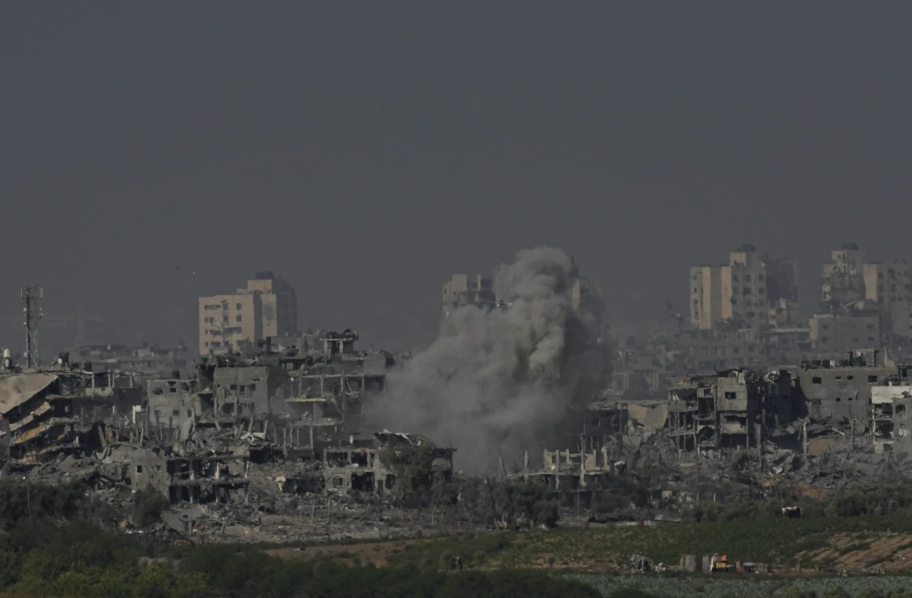Israel-Palestine: Unpacking A Conflict Rife with Contradiction
Photo Via AP News
PEER KHAN: The recent conflict that has occurred within the Middle East have deeply shocked Georgetown students and the international community. It is crucial to condemn the innocent killing of civilians on both sides, and to stand with both the Jewish and Palestinian communities in empathizing with their suffering.
First, it’s important to understand the historical context of the conflict. Israel claims that Palestinians have willingly supported Hamas as an organization and its extremism. However, while Palestinians did narrowly vote for Hamas in a 2006 election in Gaza, Israel’s claim is unfounded. Israel’s aggressive expansion and its systemic displacement of millions of Palestinians through successive conflicts since 1948 have made it difficult for any legitimate Palestinian state to be formed.
Hamas' founding and growth were heavily influenced by Israeli involvement. As part of its strategy to undermine moderate and pro-peace groups like the Palestinian Liberation Organization (PLO) and Fatah, the Israel Defense Forces (IDF) provided financing to extremist groups that would form Hamas during the 1980s. The Israeli military's poor judgment and willingness to support terrorists as a political "counterweight" makes them partially responsible for recent tragedies. The vast majority of Palestinians are not extremists, and they do not have the tools to shape their own future. Children make up half of the Gaza Strip's population, which indicates a dismal life expectancy. When people lack access to basic necessities including food, water, and fuel, then they will naturally become more desperate and violent. History has taught us that desperate people always choose desperate options. The question readers must ask themselves is if the desperate person is at fault, or the state that systematically made them desperate shares the blame.
Additionally, Israeli Prime Minister Netanyahu, who earlier this year was facing international criticism from the U.S. and other Western nations, seems to have become an international hero overnight. He has managed to gain broad support from international partners, and a unity government to ensure his continuance as PM. All of this takes away focus from his numerous corruption cases and his highly threatening attack on Israeli democracy by weakening Israeli courts and ignoring massive protests from the Israeli people. Without a focus on Netanyahu’s actions, Israeli citizens will be forced to trade their democratic institutions for the genocide of their Palestinian neighbors.
Similarly, Hamas clearly values their own power and influence over Gazans’ freedom and well-being, as otherwise they wouldn’t carry out such an egregious attack on Israel for fear of a brutal military response. Indeed, Hamas’ top leadership, including their main leader Ismail Haniyeh, live with their families in the safe and luxurious hotels of Qatar. Just like Netayahu, they can carry out such a brutal attack because they don’t have to live with the consequences and brutal bloodshed that follows. A conflict only distracts the Palestinian people from improving their domestic political and economic predicament, and sets Gaza back in terms of infrastructure and growth.
The US needs to stop supporting Israel’s war crimes, not just because it helps Palestinians but also because it will be beneficial for Israelis as well. If Israel continues to violate human rights and starve Gaza, then the children suffering in Gaza today will inevitably become Hamas extremists in the future. The American Revolution began in part because the British imposed high taxes on products like tea. If the next generation of Gazans cannot find food or water, repeated injustices will only inspire new cycles of violence.
As Martin Luther King Jr. famously stated, “Injustice anywhere is a threat to justice everywhere.” The US must stop injustice in Gaza, because failing to do so establishes a precedent for mass human rights violations that threaten the entire world.
Peer Khan is a staff writer for On The Record. He is a freshman in the School of Foreign Service studying international politics from Pittsburgh, Pennsylvania.

